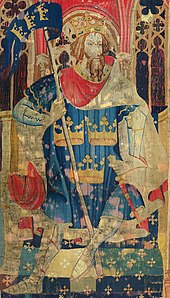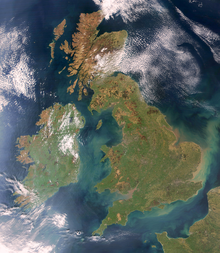| Revision as of 00:30, 4 November 2018 editJay942942 (talk | contribs)Extended confirmed users8,940 edits →List of British nationalist partiesTags: Mobile edit Mobile web edit← Previous edit |
Revision as of 11:21, 24 November 2018 edit undoAtchom (talk | contribs)Autopatrolled, Extended confirmed users45,088 editsm clean up, replaced: British Prime Minister → British prime ministerTag: AWBNext edit → |
| Line 7: |
Line 7: |
|
British nationalism's unifying identity descends from the ] who dwelt on the island of ].<ref name="Guntram H. Herb 2008"/> British nationalism grew to include people outside Great Britain, in ], because of the ], which declared that the crown of Ireland was to be held by the ruling monarch of ] as well as ] calls for unity with Britain.<ref>Brendan Bradshaw, Peter Roberts. British Consciousness and Identity: The Making of Britain, 1533-1707. P. 302.</ref> |
|
British nationalism's unifying identity descends from the ] who dwelt on the island of ].<ref name="Guntram H. Herb 2008"/> British nationalism grew to include people outside Great Britain, in ], because of the ], which declared that the crown of Ireland was to be held by the ruling monarch of ] as well as ] calls for unity with Britain.<ref>Brendan Bradshaw, Peter Roberts. British Consciousness and Identity: The Making of Britain, 1533-1707. P. 302.</ref> |
|
|
|
|
|
It is characterised as a "powerful but ambivalent force in British politics".<ref>{{harvnb|Smith|Smith|White|1988|p=61}}.</ref> In its moderate form, British nationalism has been a ], emphasizing both cohesion and diversity of the people of the United Kingdom, its dependencies, and its former colonies.{{sfn|Motyl|2001|pp=64}} However, ] nationalism has arisen based on fear of Britain being swamped by immigrants; this ] nativist nationalism has manifested politically in the ] and other nativist nationalist movements.{{sfn|Motyl|2001|pp=64}} Politicians, such as former ] ], have sought to promote British nationalism as a progressive cause.<ref>Conservative Party leader David Cameron advocates liberal or civic British nationalism: "Being British is one of the most successful examples of inclusive civic nationalism in the world." http://www.conservatives.com/News/Speeches/2006/09/Cameron_I_will_never_take_Scotland_for_granted.aspx www.conservatives.com Official party site (26 September 2006)</ref> |
|
It is characterised as a "powerful but ambivalent force in British politics".<ref>{{harvnb|Smith|Smith|White|1988|p=61}}.</ref> In its moderate form, British nationalism has been a ], emphasizing both cohesion and diversity of the people of the United Kingdom, its dependencies, and its former colonies.{{sfn|Motyl|2001|pp=64}} However, ] nationalism has arisen based on fear of Britain being swamped by immigrants; this ] nativist nationalism has manifested politically in the ] and other nativist nationalist movements.{{sfn|Motyl|2001|pp=64}} Politicians, such as former ] ], have sought to promote British nationalism as a progressive cause.<ref>Conservative Party leader David Cameron advocates liberal or civic British nationalism: "Being British is one of the most successful examples of inclusive civic nationalism in the world." http://www.conservatives.com/News/Speeches/2006/09/Cameron_I_will_never_take_Scotland_for_granted.aspx www.conservatives.com Official party site (26 September 2006)</ref> |
|
|
|
|
|
==Nationalism and unionism== |
|
==Nationalism and unionism== |
|
Nowadays, as in the past, unionist movements exist in ] and ]. These movements seek specifically to retain the ties between those areas and the rest of the ], in opposition to civic nationalist movements. Such unionist movements include the ], ] and the ]. In ] and ] the ], ], ], and ] support the Union. British nationalists are generally supportive of unionism. |
|
Nowadays, as in the past, unionist movements exist in ] and ]. These movements seek specifically to retain the ties between those areas and the rest of the ], in opposition to civic nationalist movements. Such unionist movements include the ], ] and the ]. In ] and ] the ], ], ], and ] support the Union. British nationalists are generally supportive of unionism. |
|
|
|
|
|
==History of British nationalism== |
|
==History of British nationalism== |
It is characterised as a "powerful but ambivalent force in British politics". In its moderate form, British nationalism has been a civic nationalism, emphasizing both cohesion and diversity of the people of the United Kingdom, its dependencies, and its former colonies. However, nativist nationalism has arisen based on fear of Britain being swamped by immigrants; this anti-immigrant nativist nationalism has manifested politically in the British National Party and other nativist nationalist movements. Politicians, such as former British prime minister David Cameron, have sought to promote British nationalism as a progressive cause.



